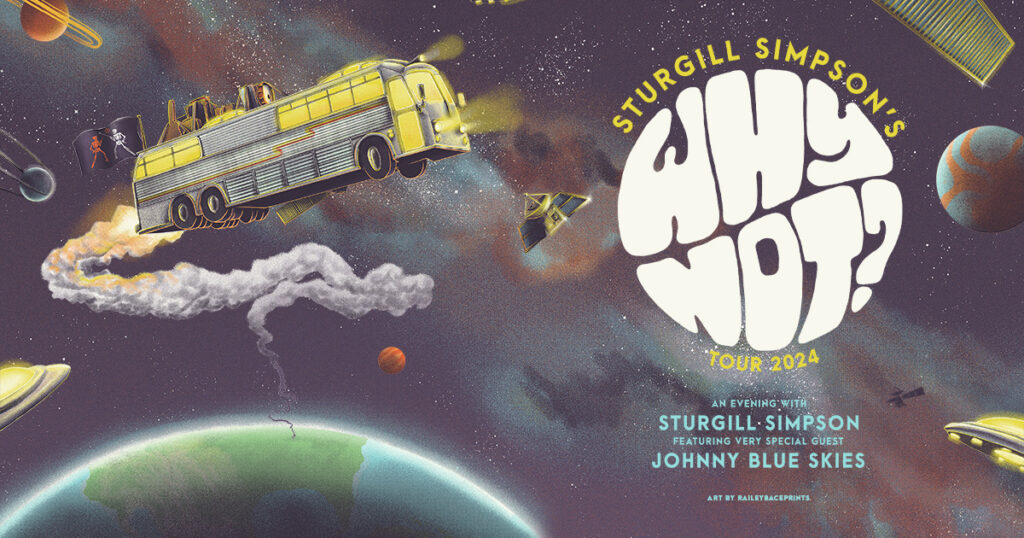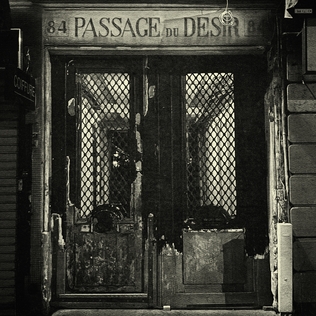For nearly three years, he’s been a veritable ghost within the music scene, spending his time on an “eat-pray-love” adjacent journey stretching from Europe to Thailand following a nearly career-ending injury while touring with Willie Nelson’s Outlaw Festival.
Sturgill Simpson may have taken his bow, but Johnny Blue Skies follows strongly in his wake.
Under the adopted pseudonym, Simpson’s latest release “Passage Du Desir” brings one of Country’s favorite crooners back to the foreground.
The album wistfully follows those sojourns, from beachside escapes to uniquely Parisian malaise.
While not a faithful record of his lost period, the album chronicles the death of the musician’s previous image.
To quote “Scooter Blues,” the album’s third track: “When people say are you him I’ll say not anymore.”
“Who Is Sturgill Simpson?” has followed the songster since his 2016 Grammy nomination.
From the cowpoke troubadour on “The Ballad of Dood and Juanita” to the chicken-picking front porch guitar man of “Cuttin’ Grass Vol. 1: The Butcher Shoppe Sessions,” Simpson has always been an auteur on the outskirts of the Nashville ecosystem, a constantly evolving character shifting identities as he sees fit.
Yet, there’s an overarching similarity to the sophisticatedly sad Honky Tonk guitars and strings of “A Sailor’s Guide to Earth,” released in 2016.
Loss, ego death and rediscovery are a miasma floating across his discography, none more so than “Passage Du Desir,” except now, the burden of success weighs heavily upon an alienated sound.
Beyond the whines of an ungrateful celebrity – how many poor souls in Nashville would kill to have a Grammy-nominated album? – Simpson dips into the hermetic, occult and obscure musings about what of his identity is left when the music fades.
Despite the distance from his made man’s name and the nom-de-plume, there’s a more honest and unvarnished glimpse of the man between the notes than audiences have seen in years.
Sonically, Sturgill Simpson came home.
Why Not?
Following his musical return, Simpson and company were back on the road as well with the “Why Not Tour?” promoting an “evening with Sturgill Simpson featuring very special guest Johnny Blue Skies.”
Or, long story short: Approximately three hours of Simpson jamming on whatever songs floated his fancy – and it was phenomenal.

For two nights, Simpson set up shop at Koka Booth Amphitheatre, welcoming a full house for both sets.
Initially only booked for Tuesday, October 22, a second charity show was added for Monday, October 21.
This additional show benefitted the North Carolina Disaster Relief fund and replaced the canceled Asheville show in the wake of Hurricane Helene’s destruction.
A heady exploration of Simpson’s standards and the burgeoning Blue Skies discography resulted in nearly six hours of tried-and-true all-American jams across the back-to-back gigs.
Luckily, I could squeeze in for the Tuesday night show, and I can easily say that he is one of the most gifted entertainers gracing our stages right now.
Sturgill Simpson or Johnny Blue Skies, whatever you want to call him, is absolutely the real deal.
With no more than three instances of crowd banter, organically weaving through his and everyone else’s catalog for hours, Simpson left both bandwagoners and diehard fans alike slack-jawed with awe.
Normally, I am the gatekeeping queen: knowing one or two greatest hits is insufficient to stand shoulder-to-shoulder in the pit. Earn your spot as a fan.
But, I can’t help but imagine that many of these bottle blondes in brand new boots and their dull companions in artfully “distressed” Carhartt and flannel walked away true converts to the church of Simpson.
Writing for WKNC with the musical palate I possess, more often than not, the bands I see are either just beginning to cut their teeth or taking their final breaths.
Comparatively, it was so wonderfully refreshing to see an artist in mid-swing; the catch Simpson not just on his prodigal return, but his seemingly endless upward climb was astounding.
I was incredibly moved by what I bore witness to.
In a nearly sold-out venue, the pit and lawn were packed, with everyone jockeying for a marginally better view of the stage.
In a 7,000-seat amphitheater filled to the brim, you could’ve heard a pin drop during his renditions of When In Rome’s “The Promise” and Roy Orbison’s “Crying.”
Even the uninitiated rolled along to the heavier rock tracks from the massively underappreciated “Sound and Fury”.
A blistering introduction for newer fans and the expected homecoming for the old, Simpson left it all on the floor with cascading solos, breakdowns, and extended jams.
I walked out of the venue with the unmistakable feeling that with or without the pseudonym, we would be talking about him for a very long time.

